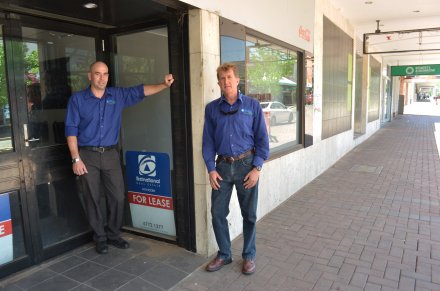-
Featured Items
-
Featured Resources
 Funding & Grants
Don't miss out on funding opportunities. Stay informed with our up to date online listings and email notifications.
Read More
Funding & Grants
Don't miss out on funding opportunities. Stay informed with our up to date online listings and email notifications.
Read More
 Skilled Migration
Our services help both applicants and employers, to learn more, develop plans, submit applications, and settle in.
Read More
Skilled Migration
Our services help both applicants and employers, to learn more, develop plans, submit applications, and settle in.
Read More
 Research and Analysis
Good research and analysis makes the case. How can our resources and services help your project or application?
Read More
Research and Analysis
Good research and analysis makes the case. How can our resources and services help your project or application?
Read More
 Information & Data Resources
With resources like REMPLAN, Regional Knowledge Base, and decades of data, discover how we can help your project.
Read More
Information & Data Resources
With resources like REMPLAN, Regional Knowledge Base, and decades of data, discover how we can help your project.
Read More
-
Stay InformedSubscribe to one or more of our regular email subscriptions, to be kept up to date on news and funding opportunities for the region
-
-
Our Region
- Our Region
- Regional Plan
- Regional Data
- Current Regional Issues
- Population Migration Analysis for 2016-21
- Job Vacancies Continue at All-Time High
- National Debt - What it Means for Our Economy?
- The True Value of Home Solar
- The Economic Impacts of Local Government Amalgamations
- State of the Regions Report 2014-15
- Antifragility - A different take on regional economic development
- Biohubs - Collaborative Waste Management
- Attracting New Residents
- Socio-Economic Impacts of the Murray Darling Basin Plan
- Murray Darling Basin Water Recovery
- Growing Businesses
- The Northern Inland Economy
- Geographical Overview
- Major Industry Sections
- Our Services
- Grants and Funding
-
Skilled Migration
- Skilled Migration
- Skilled Employer Sponsored Regional Visa
- Skilled Work Regional Visa (subclass 491)
- Temporary Seasonal Workers
- Designated Area Migration Agreement (DAMA)
- Helpful Information for Visa Holders
- Information for Employers
- Case Studies
- Payment Details
- Advice & Further Information
- Contact Details
- News & Events
-
Our Projects
- Our Projects
- Current Projects
- Skilled Migration
- Wool Works - Wool Training Schools
- Metal Works - Welding and Fabrication Schools
- Come On Inland
- Stories of Resilience
- Alt Brothers Beekeeping - Glen Innes
- Carelle's Toy Store - Glen Innes
- Greenhill Orchards - Arding
- Gwydir Meats - Warialda
- Kaputar Motors - Narrabri
- Moonbi General Store - Moonbi
- Sandstock - Tingha
- Sherelle Fashions - Tenterfield
- Sleepy Merino - Inverell
- Tenterfield Chamber of Toursim, Industry and Business - Tenterfeild
- The Welders Dog - Armidale
- Walcha Veterinary Supplies - Walcha
- AGCAP - Agribusiness Careers & Professions
- Northern Inland Regional Investment Profile
- Past Projects
- Digital Economy Strategy
- Business Growth Project
- Go Digital
- How to Start an Online Business
- Create Your Website Using Squarespace
- How to Edit Your Squarespace Site - Part 1
- How to Edit Your Squarespace Site Part 2
- Add a Shop to Your Squarespace Site
- Start a Blog and Find out What Customers are Searching
- 14 Tips For a Better Blog Post
- Which Social Media Platforms are Best for Your Business
- How to Use Facebook Effectively For Your Business – Part 1
- How to Use Facebook Effectively For Your Business – Part 2
- Instagram Tips for Business
- Catching Up, More Instagram & Dealing with Haters
- Getting Started with Twitter for Business
- Social Media Scheduling Tools
- How to Start an Etsy Shop – Part 1 – Research
- How to Start an Etsy Shop – Part 2 – Signup
- Online Security for Your Business
- Product Photography and Website Images: Your Guide
- 5 Tips to Improve your Productivity in your Business
- Best Online Business Resources
- How to Improve Your Communication Skills and Win More Clients
- NBN Coordinator
- Putting Power Back in the Regions
- Road Freight Study
- Town Audit Benchmarks
- Food and Wine
- Youth Survey
- Digital TV Switchover Assistance
- Northern Inland Transport Guide
- Live.Train.Work
- Northern Inland Innovation Awards
- Northern Inland Innovation Awards - 2017
- Northern Inland Innovation Awards - 2016
- Northern Inland Innovation Awards - 2015
- Northern Inland Innovation Awards - 2014
- Northern Inland Innovation Awards - 2013
- Northern Inland Innovation Awards - 2012
- Norther Inland Innovation Awards - 2011
- Prime Super Northern Inland Innovation Awards - 2010
- Prime Super Northern Inland Innovation Awards - 2009
- Northern Inland Innovation Awards - 2007
- Northern Lights Project
- NBN Smart Home
- Murray Darling Basin
- Moree Plains Business Workshops
- Namoi Investment Prospectus
- Industrial Land
- Bioenergy and Local Electricity Retailing
- Northern Inland Business Energy Assessment
- Skills for the Future
- Impacts of COVID-19 on Businesses
- Past Projects of NIRDB
- Aboriginal Employment and Enterprise in the Gunnedah Region
- Art as an Industry
- Aviation Survey
- Farm Forestry - Northern Inland Forestry Investment Group
- New England North West Film Strategy
- Northern Inland Excellence in Business Awards
- Food and Wine 2003 - 2008
- Prime Super Northern Inland Innovation Awards 2009
- Regional Business Networking Program
- Regional Leadership Course 2008
- Viticulture Strategy 2002-2003
- About Us
- Contact Us
- Other Resources
- Privacy and Legal
- Search
- News & EventsNews & Events
- NewslettersNewsletters
- Non-farm businesses, the forgotten drought casualtiesNon-farm businesses,…
Back to Newsletters
Non-farm businesses, the forgotten drought casualties
Thursday 7th of November 2019
Non-farm businesses are the forgotten casualties of the worst drought in living memory, a business survey with very strong participation in the Northern Inland region of NSW is revealing, according to Regional Development Australia Northern Inland (RDANI) Chair Russell Stewart.
“We welcome the Federal Government’s drought assistance package announced today but sadly, it is lacking genuine understanding. It shows that the economic realities in drought affected communities are not understood in Canberra. Today’s package includes loans of questionable value for what the Government has referred to as farm-dependent businesses. This refers to agricultural sub-contractors and rural suppliers. The definition must be broadened to cover all non-farm businesses in acutely drought affected communities,” Mr. Stewart said. “Our CBDs are in decline. Drought assistance is largely focused on farm enterprises and the latest drought package proves that the devastating economic impacts that the drought has had on other regional businesses remains unrecognised and undervalued,” Mr. Stewart said.
For RDANI Senior Project Officer David Thompson, the incomplete picture of the economic impacts of the drought became apparent after broad engagement with businesses throughout the region. “During the course of our work we meet business owners across all sectors of our local economies, not just the farmers,” he said. “Media coverage picks up on the obvious images of desolate paddocks, dry dams and hand-fed stock, yet the flow-on impacts to our other regional businesses is far less visual or newsworthy, but just as important. We decided to survey non-farm businesses to see how they are faring in the drought and what type of assistance they said would be most beneficial to them”.
So far, 305 non-farm businesses have responded to the survey, answering questions about changes in turnover and staffing levels, and the types of government policy actions which would help them survive this and future droughts. Feedback came from all sectors of the economy, with particularly high responses from retail businesses, businesses which support agriculture and food and accommodation providers.
“The survey will close on November 15th, and we have commenced collating the results” said Mr. Thompson. “To date, we have looked at the impacts of the drought on non-farm business performance, and shortly we will examine what types of assistance these businesses would like provided by all tiers of government”.
Results examined so far revealed that the impact of the drought on non-farm business turnover (i.e. sales income) during the 2018-19 financial year was substantial. Interim results are that 59% of businesses report a turnover reduction in the range of 11-50%, 12% of businesses record a reduction of between 51-75%, and several businesses reported turnover reductions of 76-100%. Only 5.7% of non-farm businesses reported a turnover increase. Forward expectations are also poor with 54% of businesses expecting their turnover to be down by 11-50% in the next financial year.
Despite large reductions in sales revenue, impacts on staffing levels were less severe, with almost 50% of businesses reporting retaining all of their staff over recent years. Mr Thompson said this appears to be a conscious decision by business owners to retain quality staff that they have invested time and money to train and that are good fits to their team. Businesses were more likely to adopt other strategies to remain financially viable than losing staff which is a strong positive for regional communities.
Despite this, 48% of businesses had been forced to lay staff off due to the drought, with 34% reporting a reduction of 1-2 staff members, and 6% of businesses reducing staff by more than 5 employees. 51% of businesses expected to retain all staff next financial year, but 34% expected to have to have 1-2 fewer employees in 2019-20 and 12% expect to have 3 or more fewer staff.
Allowing clients more time to pay their accounts is a tactic businesses are often forced to adopt during drought conditions in order to support their customers. 42% of businesses reported outstanding customer accounts in the range of $1-30,000, while 11.5% were owed $30,001-$60,000 and 8% of businesses were owed more than $200,000.
“These results illustrate the hardship non-farm businesses are experiencing as a result of the drought” Mr. Stewart said. “Our Northern Inland economy is heavily dependent upon agriculture with 16% of output and 15% of employment coming from that sector, but when farming businesses suffer, so does the rest of the economy, as the cashflow to all the service and support sectors is impacted dramatically. As we further analyse these results, we will also reveal some practical ways in which governments can assist non-farm businesses during this drought”.
RDANI Executive Director Nathan Axelsson said the survey will remain open for input until November 15th and can be accessed through RDANI social media or directly, at:
https://www.surveymonkey.com/r/DroughtImpactOnBusinesses
“If you're a Non-Farming Business in the region please fill out the survey so that we can gather evidence for a call to action. It'll only take five minutes and can be completely anonymous. We look forward to getting the results in the hands of policy-makers, who appear to be floundering with reactive stop-gap measures at present” he said.
Related Pages







 Latest News
Latest News

